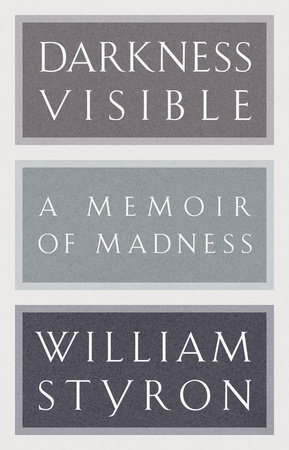Content warning: depression and suicide
The vast metaphor which most faithfully represents this fathomless ordeal . . . is that of Dante, and his all-too-familiar lines still arrest the imagination with their augury of the unknowable, the black struggle to come:
In the middle of the journey of our life
I found myself in a dark wood,
For I had lost the right path.
Early in his brief “memoir of madness” Darkness Visible, William Styron tells us about the op-ed he wrote for the New York Times after Primo Levi’s suicide, which to his great annoyance had left so many “worldly writers and scholars . . . mystified and disappointed.” “The argument I put forth,” he explains,
was fairly straightforward: the pain of severe depression is quite unimaginable to those who have not suffered it, and it kills in many instances because its anguish can no longer be borne.
Straightforward, perhaps, but the “spontaneous—and enormous” reaction to his article convinced him that it was worth saying more about his own experiences with depression. The result was first a lecture, then an article in Vanity Fair, and then this slim but powerful book.
 I read Darkness Visible on the recommendation of a friend who knew that I have been struggling to understand Owen’s decision to end his life from his point of view, not just because he did not share many details of his struggle but because I have never experienced depression myself—sadness, yes, and now grief, but these are far from the same thing.
I read Darkness Visible on the recommendation of a friend who knew that I have been struggling to understand Owen’s decision to end his life from his point of view, not just because he did not share many details of his struggle but because I have never experienced depression myself—sadness, yes, and now grief, but these are far from the same thing.
There are always going to be things about Owen’s life and death that elude my understanding. An article I read about grief after suicide loss talks about the damage suicides do to people’s “assumptive world,” the things they assume to be true, which includes their beliefs about other people. There can perhaps be no more drastic reminder that other people are ultimately, precisely, other. I am working on accepting that many questions I have will never, can never, be answered. I also think it would be a mistake to think that depression in itself answers those questions: for one thing, as Styron emphasizes, many—in fact, most—people who suffer with depression survive it:
one need not sound the false or inspirational note to stress the truth that depression is not the soul’s annihilation; men and women who have recovered from the disease—and they are countless—bear witness to what is probably its only saving grace: it is conquerable.
Still, keeping that in mind, and also knowing that Styron’s experience was uniquely his own (something else Styron is clear about—”I don’t intend my ordeal to stand as a representation of what happens, or might happen, to others”), I was grateful, reading Darkness Visible, for the clarity and intensity of its depiction of depression from the inside, from the perspective of the sufferer. It was not an easy read, especially in my situation, but it made depression less “unimaginable” for me.

In the hospital I partook of what may be depression’s only grudging favor—its ultimate capitulation. Even those for whom any kind of therapy is a futile exercise can look forward to the eventual passing of the storm. If they survive the storm itself, its fury almost always fades and then disappears. Mysterious in its coming, mysterious in its going, the affliction runs its course, and one finds peace.
 Not always, of course, and as a book like this can only be written by just such a survivor, it is bound to tilt more towards optimism than might in other cases seem warranted. From his own experience, Styron appreciates that convincing a depressed person (usually “in a state of unrealistic hopelessness”) to see things as he now does is “a tough job”:
Not always, of course, and as a book like this can only be written by just such a survivor, it is bound to tilt more towards optimism than might in other cases seem warranted. From his own experience, Styron appreciates that convincing a depressed person (usually “in a state of unrealistic hopelessness”) to see things as he now does is “a tough job”:
Calling ‘Chin up!’ from the safety of the shore to a drowning person is tantamount to insult, but it has been shown over and over again that if the encouragement is dogged enough . . . the endangered one can nearly always be saved.
In some ways, these cheering “chin up” sections of the book were harder for me to read than the other, grimmer parts. This one in particular actually angered me, for implicitly blaming friends and families for not offering dogged enough encouragement or, Styron’s other key term, “devotion,” to save their loved ones.
Instead, insofar as depression is an explanation for “drowning,” its deadly force surely lies in what Styron powerfully conveys as its horrors, which can be “so overwhelming as to be quite beyond expression”:
for those who have known it, [depression] is a simulacrum of all the evil of our world: of our everyday discord and chaos, our irrationality, warfare and crime, torture and violence, our impulse toward death, and our flight from it held in the intolerable equipoise of history.
“If our lives had no other configuration than this,” he considers that “we should want, and perhaps deserve, to perish.”
 True to his own experience, though, Styron does not end on this gloomy note, but on a more uplifting one:
True to his own experience, though, Styron does not end on this gloomy note, but on a more uplifting one:
For those who have dwelt in depression’s dark wood, and known its inexplicable agony, their return from the abyss is not unlike the ascent of the poet, trudging upward and upward out of hell’s black depths and at last emerging into what he saw as “the shining world.”
The last words of the book are not his but Dante’s:
And so we came forth, and once again beheld the stars.
I only wish that were true for us.
You do point out that “a book like this can only be written by just such a survivor, it is bound to tilt more towards optimism than might in other cases seem warranted.” Stryon survived to tell his own tale.
LikeLike
You are brave to write this Rohan. As a survivor from depression myself I can follow what Styron is saying. Thanks for sharing a book I have not met.
LikeLike